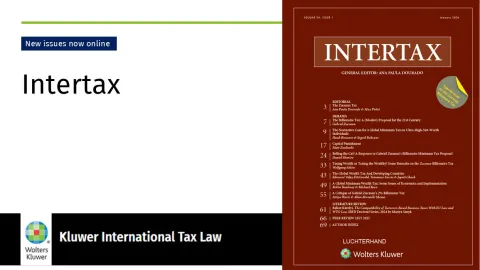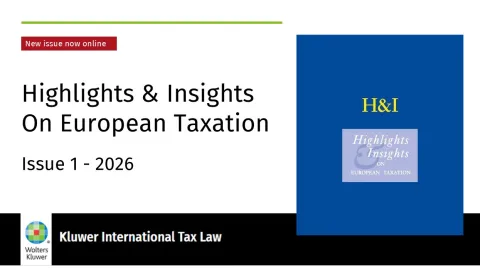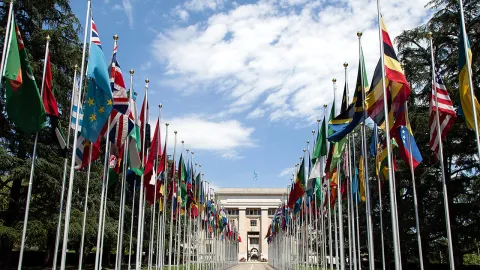Cross-Border Donations under Siege: The Münster Court’s Restrictive Ap-proach to EU Fundamental Freedoms
September 22, 2025
A Münster Fiscal Court’s late 2023 judgment illustrates a structural fault line in European tax law: while EU law promises free movement of capital, national courts continue to prioritize domestic formal requirements for non-profit organizations. The result is a chilling effect on cross-border philanthropy and a setback for the vision of a European donation market.
In this post I first break down the core of the court’s ruling, secondly, I draw the parallel to EU legislation, followed by the application to the case in question, and closing with a legal assessment of the impact this ruling has on the landscape of cross border donations.
The ruling in question decides on the deductibility of a donation from a German donor to an Italian organizzazione non lucrativa di utilità sociale ("non-profit organization of public benefit"). The NPO in question is dedicated to the socio-medical care of children suffering from cancer.
In this judgment, the deductibility of a donation from the German tax base was not admitted, which on its own constitutes a rejection of a cross-border donation. A donation to a German NPO on the other hand would’ve been likely to be deductible, which shows that the issue at hand mainly stems from German legal provisions discriminating against cross-border cases.
Following the reasoning of the Fiscal Court of Münster, NPO’s that are not taxable in Germany might still have to follow German non-profit-laws to receive donations from German donors, that are deductible in Germany. This stance would also mean that capital owned by German taxable entities is less likely to flow to foreign NGOs.
II. The Court’s Decision
After weighing up national and European provisions, the Fiscal Court of Münster reasons that even in cross-border situations, the German formal standards of non-profit-law must prevail. It is claimed that these strict formal standards do not constitute a restriction of free movement of capital guaranteed in Art. 63 Treaty on the European Union (TEU). In this regard, the Tax Court of Münster refers to judgments of the German Federal Fiscal Court (FFC) and the European Court of Justice (ECJ).2
The Fiscal Court of Münster argues that the German General Tax Code (GTC) explicitly asks for certain provisions to be included verbatim. Therefore, sections that are included in conformity with foreign domestic NPO-regulations lead to a conflict with German NPO-law. This means that for a foreign NPO to receive funds from Germany, they must meet German standards in regard to their statutes and way of conducting their activities.
The core line of reasoning of the Fiscal Court of Münster is the unrestricted applicability of German formal requirements. The argument is based on the fact that the German formal requirements can technically be fulfilled by foreign corporations.3 Hereby, the Fiscal Court of Münster classifies formal legality higher than the fostering of the (European) common good.
Finally, the Fiscal Court of Münster rests their argument on the lack of harmonization of European non-profit-law. They continue by stating that it’s not the responsibility of German courts to unify European non-profit legislation but it’s rather upon the European Union to initiate the harmonization of the European market in the area of NPO’s.
III. EU Law as Backbone of Free Movement of Capital
However, past instances have shown: Already existing EU legislation regulating the free movement of capital might already be applicable to NPO’s and its donators as well.
The free movement of capital pursuant to Art. 63 TFEU generally refers to the protection of cross-border capital movements, including donations.4 This is intended to prevent the restrictive and discriminatory application of national rules that are likely to prevent, significantly complicate or make a cross-border movement of capital unattractive.5 In this context, provisions of national tax (and NPO-taxation) law are likely to constitute such a restriction.6
Like other fundamental freedoms, the scope of protection of the free movement of capital must, for the sake of the common market, be understood broadly at first.7 Consequently, a domestic regulation that has a restrictive effect on the movement of capital usually falls within the scope of the provision and is therefore prohibited under Art. 63 TFEU.8
That restriction may however be justified by the reasons mentioned in Article 65 TFEU.9 Nevertheless, the justification itself is limited by Article 65 para. 3 TFEU.10 This limitation ensures that national legislation does not constitute a disguised restriction.
Especially in the realm of tax law, the existence of a restriction of Article 63 TFEU must be examined in the aforementioned order (scope, justification, proportionality) to preserve the fundamental freedoms in their necessary extent as guaranteed by EU law.11
Finally, and less technically speaking, a free market protected by fundamental freedoms also means a way to promote the idea of the European common good by ensuring a uniform donation market.12 A restriction of the free movement of capital thus endangers not only the common market, but also the postulate of a European common good.
IV. How this applies to the case ruled by the Fiscal Court of Münster
In Germany, non-profit status and the associated work for the benefit of the general public formally begins with the determination of statutory purposes that a corporation wants to achieve.13
In the present case, the Fiscal Court of Münster criticises that the purposes pursued and their realisation may not be sufficiently defined in the statutes of the Italian NPO.
However, if one compares the purposes of the Italian statutes with the German model statutes, hardly any differences can be found:
| Section 1 para. 1 of the model statutes "The - ... (Corporation) […] pursues exclusively and directly charitable [...] purposes [...]." |
Vs.
| Art. 3 of Statutes of the Italian NPO "The foundation was founded to exclusively pursue purposes of social solidarity [...]." |
The statutes thus comply with the German structural requirement of sections 52 to 54 GTC (purposes, "What for?") and Sections 65 to 68 GTC (special-purpose enterprises, "By doing what?").
Although the Italian and German civil and tax law provisions on the recognition of non-profit status are comparable, the application of Italian law would be neglected if the examination of non-profit status were to be limited by the filter of German norms, which are in fact heavily influenced by German civil law, and in turn cannot be applied in the Italian context.
V. Legal Impact Assessment and Conclusion
In conclusion, rulings by the ECJ like “Centro di Musicologia Walter Stauffer” and “Hein Persche” have shown that the existing European fundamental freedoms already apply to NPO’s as well.
While a harmonization of NPO-law would help alleviate some of the insecurities around the donation market and shall therefore be welcomed, it is not necessary in order to treat cross border donations the same as domestic donations.
Consequently, the German legislative and judicative must continue to follow the standards set by the European fundamental freedoms. That is true more than ever considering newly introduced legislation that might constitute another heavy infringement of the European freedom of movement of capital pursuant to Art. 63 TFEU.
In particular, the new version of section 50 para. 1 German Income Tax Ordinance (ITO)14 has fundamentally changed the recognition procedure for a cross-border donation since it came into force 01.01.2025. Instead of a claim by the foreign corporation15, an obligation for a foreign corporation has been established, to issue a donation receipt in accordance with German officially required form for the crediting of that donation. The prerequisite for the issuance of this donation receipt is the entry in the register of grant recipients. The application for registration also requires a technologically demanding procedure, which in my opinion can in itself mean increased bureaucracy for foreign corporations.
Especially considering the application forms are not yet available in English16 and foreign entities need an online certificate to access the application, this procedure is subject to practical concerns as well as resistance within EU-law.
In summary, one can argue that the earlier discussed ruling of the Fiscal Court and the current developments in German NPO legislation represent a substantial disappointment to the idea of a common donation market as well as European fundamental freedoms. Therefore, the question arises whether the ECJ might have to investigate the details of the issues at hand.
- 1
* Prof. Dr. Thorsten Helm, lawyer/tax consultant/auditor, is a partner at KPMG AG auditing company in Mannheim and at the same time an Associate Professor at the Institute for Public Finance and Tax Law at the Ruprecht-Karls-University of Heidelberg. The article was conceived with the active participation of cand. iur. Marco Michaelis, law student at the Ruprecht-Karls-University of Heidelberg and Heike Kayser, Assistant Manager at KPMG AG.
- 2E.g. Federal Fiscal Court, DStRE 2023, p. 167 para. 15; Federal Fiscal Court, DStRE 2017, p. 529 para. 20; Federal Fiscal Court, DStR 2014, p. 517 para. 16; in each case with reference to: ECJ, DStR 2009, p.207 et seq.; ECJ, DStR 2006, pp. 1736 et seq.
- 3Fiscal Court of Münster, DStRE 2024, pp. 1058, 1062, para. 49.
- 4Glaesner, in: Schwarze, EU-Commentary (“EU-Kommentar“), Art. 63 para. 7; Kalss/Klampfl, in: Dauses (found.)/Ludwigs (ed.), EU Economic Law Handbook (“Handbuch des EU-Wirtschaftsrechts“), 2024, E. E. III. para. 64.
- 5Ress/Ukroff, in: Grabitz/Hilf/Nettesheim (eds.), EU Law (“Recht der EU“), vers. 52, 2024, TFEU Art. 63 paras. 158 et seq.; Hummer/Pribas, in: Dauses (found.)/Ludwigs (ed.) EU Economic Law Handbook (“Handbuch des EU-Wirtschaftsrechts“), 2024, K. K.III. para. 226; Musil, in: Musil/Weber-Grellet, European Tax Law (“Europäisches Steuerrecht“), 2022, TFEU Art. 63 para. 22.
- 6Kraft, Foreign Tax Act (“Außensteuergesetz, AStG“), 2019, Section 6 para. 108.
- 7Kalss/Klampfl, in: Dauses (found.)/Ludwigs (ed.) EU Economic Law Handbook (“Handbuch des EU-Wirtschaftsrechts“), 2024, E. E. III. paras. 65 et seq.; Stefánsson, EuR 2016, pp. 706, 708.
- 8ECJ, judgment of 14.09.2006 – C-386/04Centro di Musicologia Walter Stauffer v Fiscal Court of München, DStR 2006, p. 1736, paras. 27 et seq.; ECJ, judgment of 07.04.2022 – C-342/20, BeckRS 2022, p. 6954, para. 49.
- 9Kalss/Klampfl, in: Dauses (found.)/Ludwigs (ed.) EU Economic Law Handbook (“Handbuch des EU-Wirtschaftsrechts“), 2024, E. E. III. para. 65.
- 10Schwenke, in: Wassermeyer, OECD-MC Commentary 2017, January 2025, before Art. 1 para. 97.
- 11Also: ECJ, DStR 2009, p. 207 paras. 38 et seq.
- 12Cf. Ruffert, JuS 2009, pp. 97, 101 et seq.; Cf. Helm, The Public Purpose („Der öffentliche Zweck“), Habilitation Thesis, Heidelberg, 2022, pp. 177 et seq.
- 13Cf. Böwing-Schmalenbrock, in: Brandis/Heuermann, Corporation Tax Act, (“Körperschaftsteuergesetz, KStG“), February 2025, Section 5 paras. 167 et seq.
- 14Federal Law Gazette 2024 I No. 108 of 27. March 2024
- 15E.g. Meyn, in: Non-Profit Law (“Gesamtes Gemeinnützigkeitsrecht”), 2024, GTC Section 60b paras. 7 et seq.
- 16Cf. "In which languages are the applications made available?", Homepage BZSt, https://www.bzst.de/DE/Unternehmen/Gemeinnuetzigkeit/Zuwendungsempfaengerregister/Fragen_und_Antworten/fragen_und_antworten_node.html (last accessed on 19. 03.2025).
You may also like








